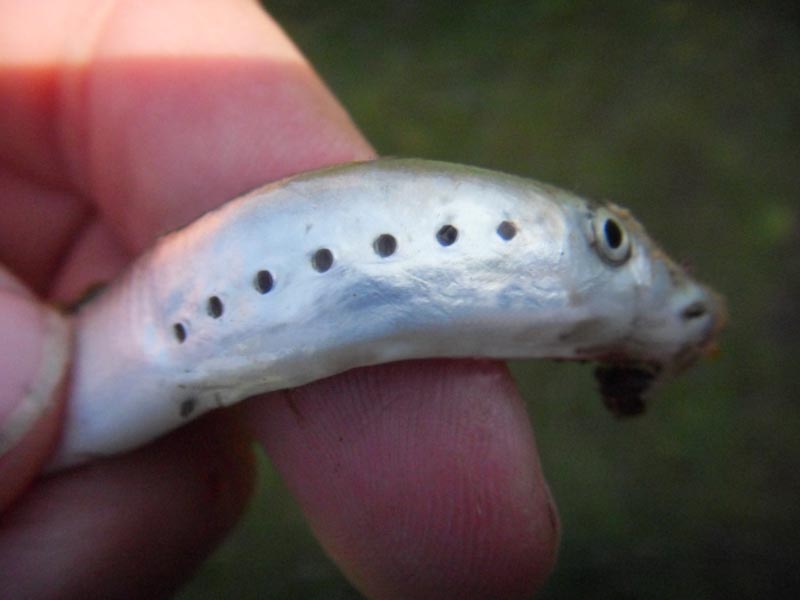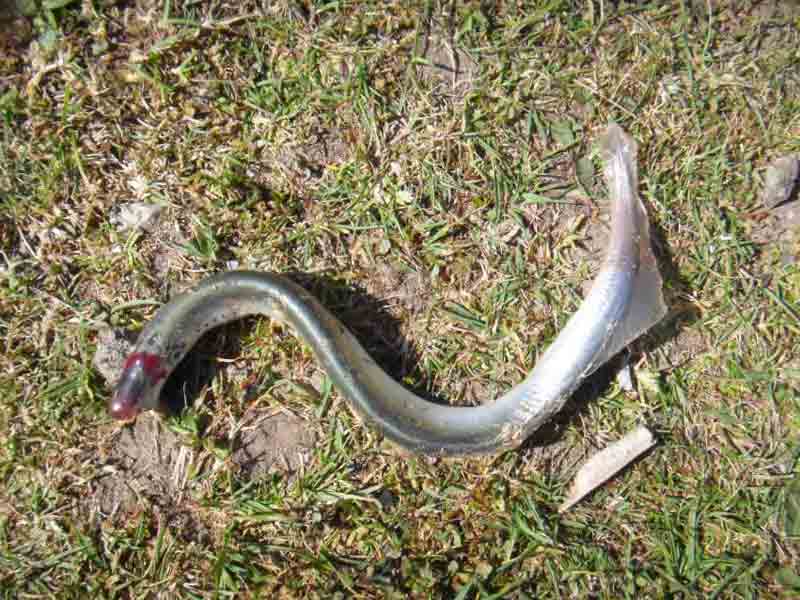European river lamprey (Lampetra fluviatilis)
Distribution data supplied by the Ocean Biodiversity Information System (OBIS). To interrogate UK data visit the NBN Atlas.Map Help
| Researched by | Morvan Barnes | Refereed by | Admin |
| Authority | (Linnaeus, 1758) | ||
| Other common names | - | Synonyms | - |
Summary
Description
Recorded distribution in Britain and Ireland
Occurs close to the coast throughout the UK and Ireland, migrating upstream many British and Irish rivers in August to spawn .Global distribution
-Habitat
Lampetra fluviatilis is a demersal and anadromous species found in a wide range of riverine and coastal habitats.Depth range
-Identifying features
- Long eel-like body up to 30-40 cm in length.
- Brown dorsal colouring, golden yellow sides and a white belly; no marbled colouring.
- Circular sucking disk for a mouth with sharp teeth.
- Seven conspiculous gill holes in a line behind the eye.
- Scales, paired fins and gill covers are absent.
Additional information
Relatively easily distinguished from the sea lamprey Petromyzon marinus by its considerably smaller size and uniform colour pattern. It can be distinguished from another species, the brook lamprey, Lampetra planeri by its much larger size (the brook lamprey rarely reaching over 18 cm in length) and the two distinct dorsal fins (the brook lamprey only having one continuous dorsal fin). Schreiber and Engelhorn (1998) however, found very little difference in the DNA content between both species suggesting Lampetra fluviatilis may just be an anadromous form of Lampetra planeri.Listed by
Bibliography
Bristow, P., 1992. The Illustrated Encyclopedia of Fishes. Chancellor Press, London.
Froese, R. & Pauly, D., 2007. Fishbase. A global information system on fishes. [On-line] http://www.fishbase.org, 2008-02-18
Howson, C.M. & Picton, B.E., 1997. The species directory of the marine fauna and flora of the British Isles and surrounding seas. Belfast: Ulster Museum. [Ulster Museum publication, no. 276.]
Igoe, F., Quigley, D.T.G., Marnell, F., Meskell, E., O'Connor, W. & Byrne, C., 2004. The sea lamprey Petromyzon marinus (L.), river lamprey Lampetra fluviatilis (L.) and brook lamprey Lampetra planeri (Bloch) in Ireland: general biology, ecology, distribution and status with recommendations for conservation. Biology and Environment. Proceedings of the Royal Irish Academy, Section B, 104B-S, 43-56.
Kurz, I. & Costello, M.J., 1999. An Outline of the Biology, Distribution and Conservation of Lampreys in Ireland. In Marnell, F. (ed.), Irish Wildlife Manuals No5
Potter, I.C. & Huggins, R.J., 1973. Observations on the morphology, behaviour and salinity tolerance of downstream migrating river lampreys (Lampetra fluviatilis). Journal of Zoology, 169, 365-379
Schreiber, A. & Engelhorn, R., 1998. Population genetics of a cyclostone species pair, river lamprey (Lampetra fluviatilis L.) and brook lamprey (Lampetra planeri, Bloch). Journal of Zoological Systematics and Evolutionary Research, 36, 85-99
Datasets
Environmental Records Information Centre North East, 2018. ERIC NE Combined dataset to 2017. Occurrence dataset: http://www.ericnortheast.org.ukl accessed via NBNAtlas.org on 2018-09-38
Isle of Wight Local Records Centre, 2017. IOW Natural History & Archaeological Society Marine Records. Occurrence dataset: https://doi.org/10.15468/7axhcw accessed via GBIF.org on 2018-09-27.
Kent & Medway Biological Records Centre, 2017. Fish: Records for Kent. Occurrence dataset https://doi.org/10.15468/kd1utk accessed via GBIF.org on 2018-09-27.
Manx Biological Recording Partnership, 2017. Isle of Man wildlife records from 01/01/2000 to 13/02/2017. Occurrence dataset: https://doi.org/10.15468/mopwow accessed via GBIF.org on 2018-10-01.
Merseyside BioBank., 2018. Merseyside BioBank (unverified). Occurrence dataset: https://doi.org/10.15468/iou2ld accessed via GBIF.org on 2018-10-01.
National Trust, 2017. Wicken Fen nature reserve species data held by The National Trust. Occurrence dataset: https://doi.org/10.15468/iqeemg accessed via GBIF.org on 2018-10-01.
NBN (National Biodiversity Network) Atlas. Available from: https://www.nbnatlas.org.
Norfolk Biodiversity Information Service, 2017. NBIS Records to December 2016. Occurrence dataset: https://doi.org/10.15468/jca5lo accessed via GBIF.org on 2018-10-01.
North East Scotland Biological Records Centre, 2017. NE Scotland fish records 1800-2010. Occurrence dataset: https://doi.org/10.15468/kjrwnd accessed via GBIF.org on 2018-10-01.
OBIS (Ocean Biodiversity Information System), 2025. Global map of species distribution using gridded data. Available from: Ocean Biogeographic Information System. www.iobis.org. Accessed: 2025-07-30
Record, 2018. RECORD Freshwater Fish Data. Occurrence dataset https://doi.org/10.15468/m5tosv accessed via GBIF.org on 2018-10-01
South East Wales Biodiversity Records Centre, 2018. SEWBReC Fish (South East Wales). Occurrence dataset: https://doi.org/10.15468/htsfiy accessed via GBIF.org on 2018-10-02.
Suffolk Biodiversity Information Service., 2017. Suffolk Biodiversity Information Service (SBIS) Dataset. Occurrence dataset: https://doi.org/10.15468/ab4vwo accessed via GBIF.org on 2018-10-02.
Citation
This review can be cited as:
Last Updated: 27/03/2008




